The world’s second-largest market for e-commerce, China has the world’s largest population that is also very tech-savvy. A very protected market, China has spurred the development of multiple local players who are fighting for domestic market share and gearing for global expansion.
The Chinese internet and e-commerce landscape which now counts hundreds of millions of users is now one of the world’s most mature and advanced, as the Chinese have become well-accustomed to using their phones and computers to buy almost anything and pay for it online.
With more than 850 million internet users, the Chinese market is by far the largest in the world. And even though China has not yet reached the high-income economic status, it is well on its way, with the largest cities already enjoying income levels that are similar to the most advanced economies. Furthermore, the country’s appetite for technology only pushes the e-commerce market forward, making it already a leader in certain categories, especially in mobile commerce and payments.
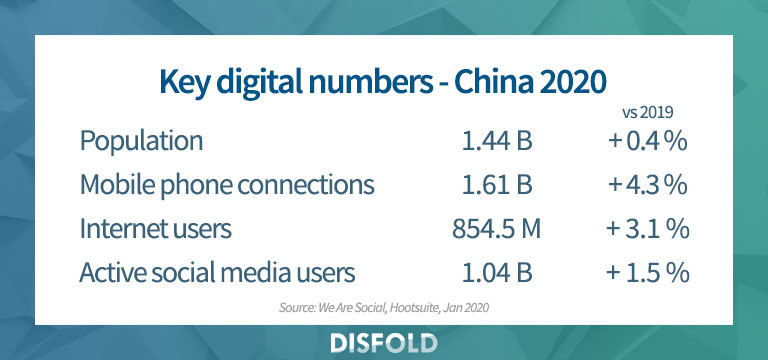
With such a large and sophisticated market, the competition in the Chinese e-commerce market is one of the world’s fiercest. Thanks to the country’s limited exposure to foreign players, many local e-commerce companies have reached the critical size that now allows them to expand abroad, especially to other Asian countries.
With such high powerful local players, foreign companies have a hard time making any significant impact on the Chinese online shopping scene. Even Amazon, the American giant of e-commerce and global leader, has failed to establish a strong foothold, and Walmart, has only been able a minority stake in one of the leaders, JD.com (see below). So any new movers will have to play heavily on innovation to grab even the tiniest share of the market.
For more information on other world-leading e-commerce actors, check our series of posts on Top E-commerce Sites, and for more information on the country, read our articles on Top Business Resources for China.
List of the top 10 Chinese e-commerce platforms by monthly traffic
To help you grasp the volumes and the competition in the Chinese e-commerce landscape, here are the current top 10 leaders of e-commerce platforms in China in 2020 and their estimated monthly traffic from SimilarWeb, as of August 2020.
Remark that the elephant in the room, Alibaba, is not present in this list with its main website alibaba.com, as it focuses on wholesale export outside of China, and therefore has no significant traffic and sales in China. The same goes for AliExpress, the group’s retail export site, as it does not allow customers in mainland China. The Chinese leader in e-commerce, Alibaba Group is however present through various other websites below: notably Taobao, Tmall, and Alibaba1688.
10. Kongfz.com
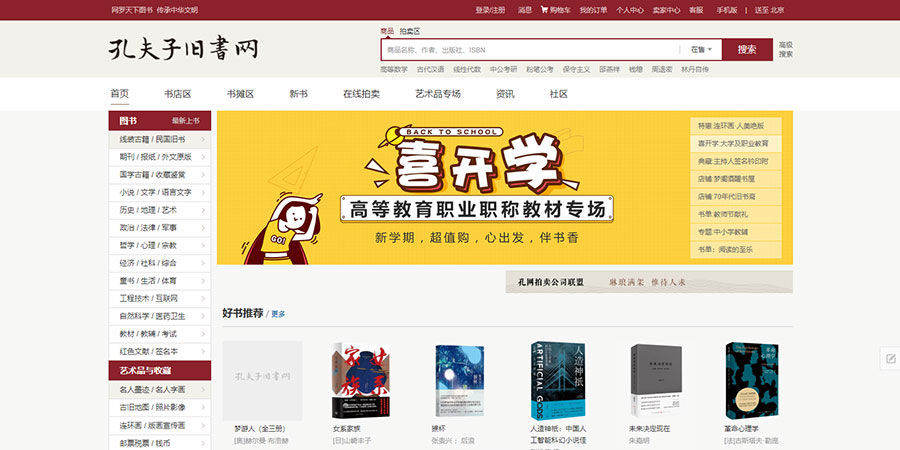
Kongfz.com is an online marketplace specialized in books. It serves as a customer-to-customer and business-to-customer platform allowing individuals and bookstores to sell new and second-hand Chinese books, often with discounts. Founded in 2002, it has become one of the leading books platforms in China, and also selling abroad, both for new and vintage books in Chinese.
Website: kongfz.com – Estimated monthly traffic: 5.1 Million visits
9. Dangdang
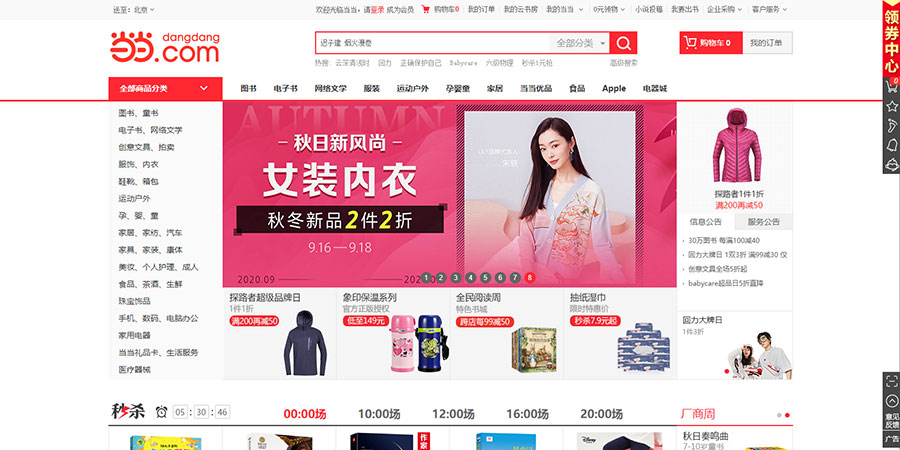
Dangdang is an online B2C department store. Founded as an online book store in 1999, Dangdang has diversified to a wide variety of products including beauty and personal care, home decoration and furniture, clothing and accessories, baby and maternity products, and electronics products.
Website: dangdang.com – Estimated monthly traffic: 5.95 Million visits
8. Vipshop

Vipshop is an e-commerce platform specialized in discount sales. Founded in 2012, it offers online shopping discounts and flash sales for more than 1,000 brands in a wide range of products including clothing and accessories, cosmetics, home products and furniture, baby care products as well as some packaged food and dietary complements.
Website: vip.com – Estimated monthly traffic: 6.1 Million visits
7. Amazon China
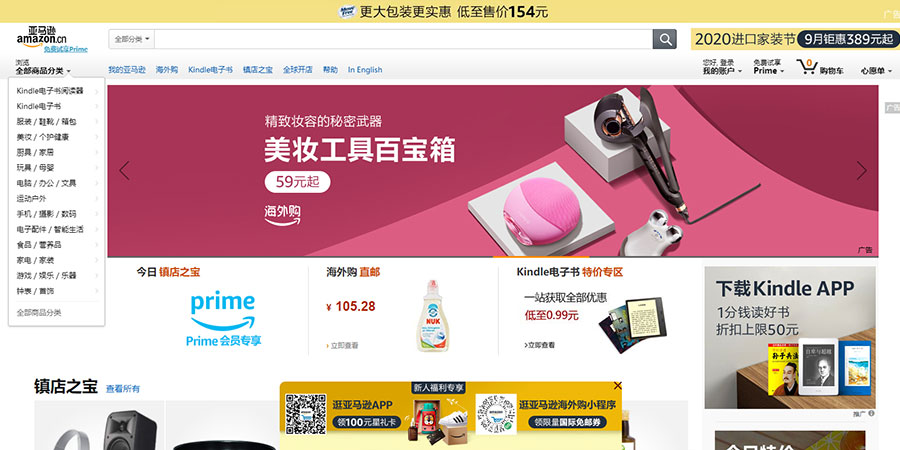
Amazon China is an online shopping website focusing on selling imported products to Chinese customers. Founded as Joyo.com in 2000 which the global e-commerce leader, Amazon, acquired in 2004, Amazon China hasn’t reached the market share it aimed for. So Amazon decided to disengage from its Chinese activities, only using the amazon.cn website to sell foreign products and a limited offer of services, including Amazon Prime, to Chinese customers.
Website: amazon.cn – Estimated monthly traffic: 11.2 Million visits
6. Xiaohongshu

Xiaohongshu, also known as Red, is a social media and e-commerce platform focusing on the fashion and shopping community. Created in 2013, it works primarily through the exchange of user-generated photos and videos of product reviews, travel blogs, and lifestyle stories through Xiaohongshu’s mobile application, where individuals can also shop for the products presented. A website also extends Xiaohongshu’s activities to internet-connected computers.
Website: xiaohongshu.com – Estimated monthly traffic: 16.8 Million visits
5. Suning.com
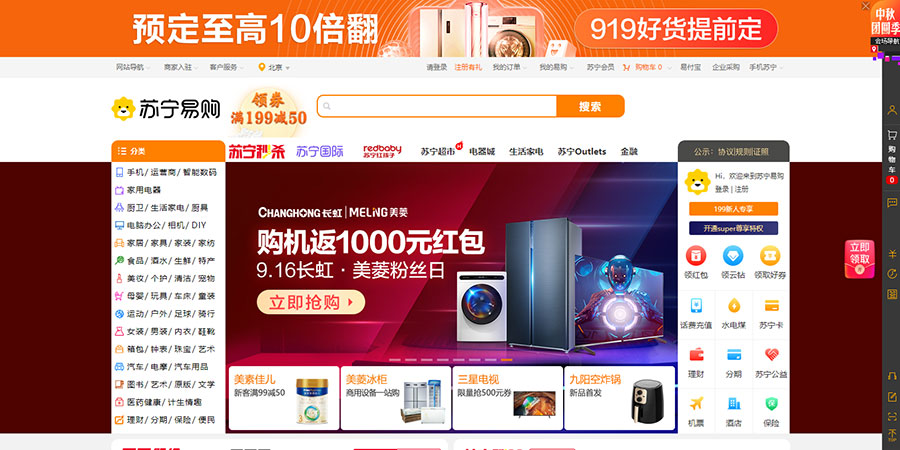
Suning.com is a chain of department stores providing electronic products and home appliances, general merchandise, household commodities, cosmetics, and baby care products, or even car parts and financial services. Founded in 1996 as Suning Commerce Group Co., Ltd, it operates more than 1,600 stores in China, Hong Kong, and Japan, and has now renamed to Suning.com Ltd to embody its expansion to e-commerce.
Website: suning.com – Estimated monthly traffic: 17.2 Million visits
4. Alibaba1688

Alibaba1688 is a business-to-business marketplace focusing on domestic trade in China. It allows wholesalers and retailers to buy and sell in wholesale a wide range of goods, primarily including clothing and accessories, home products and equipment, electronic and mechanical parts and products, tools, and many more. Launched in 2013 by Alibaba Group, it is the domestic counterpart of Alibaba.com which focuses on overseas sales.
Website: 1688.com – Estimated monthly traffic: 49.8 Million visits
3. Tmall
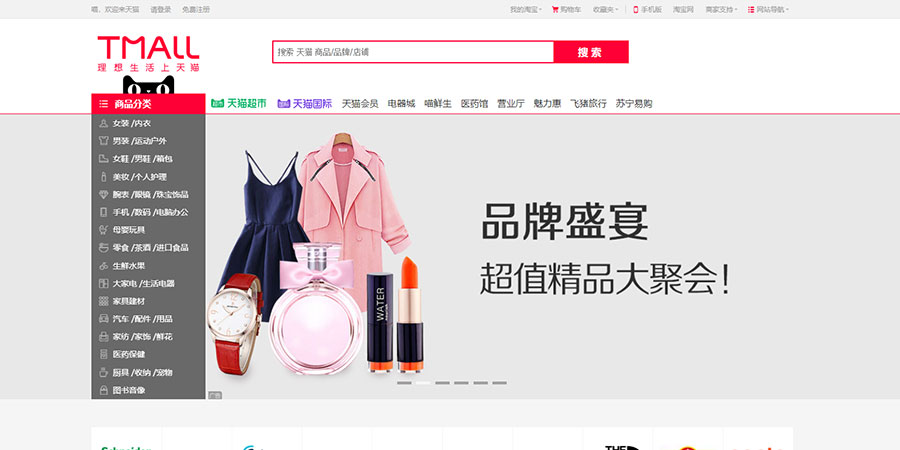
Tmall is a leading business-to-consumer retail platform that allows multiple local Chinese and international brands to sell their products to consumers online. Launched in 2008 by Alibaba Group’s Taobao as Taobao Mall, Tmall sells a broad range of products including fashion, clothing and shoes, cosmetics, jewelry, home and baby products, and packaged foods in mainland China, Hong Kong, Macau, and Taiwan.
Website: tmall.com – Estimated monthly traffic: 153 Million visits
2. JD.com

JD.com, which stands in Chinese for Jingdong, is a B2C online retailer. It provides a wide array of products including electronics and gadgets, home decoration products and furniture, clothing, and books. Launched in 1998, it used the brand and website 360buy.com before rebranding to JD in 2013. Besides its founder’s (Liu Qiangdong) 15% stake, JD is owned at 20% by the Chinese tech giant Tencent, and 12% by the American retail giant Walmart.
Website: jd.com – Estimated monthly traffic: 198.5 Million visits
1. Taobao

Taobao is a consumer-to-consumer e-commerce platform that allows individuals, retailers, and wholesalers to list freely and sell almost everything directly to buyers, from electronics and fashion to home and garden products, from sports and toys to cars and vehicles. Founded in 2003 by Alibaba Group, it follows a model that is similar to its American counterpart eBay as a marketplace where goods can be sold with a fixed or negotiated price, or by auction.
Website: taobao.com – Estimated monthly traffic: 454 Million visits
Top e-commerce websites in China compared by monthly traffic
The estimated monthly traffic from the top 10 e-commerce platforms previously listed shows the lead of C2C platform Taobao with about 450 million monthly visits, before the two B2C platforms JD.com and Tmall, which stand around 200 and 150 million visits per month respectively. Their followers are in the range of traffic volumes from 5 to 50 million visits per month.
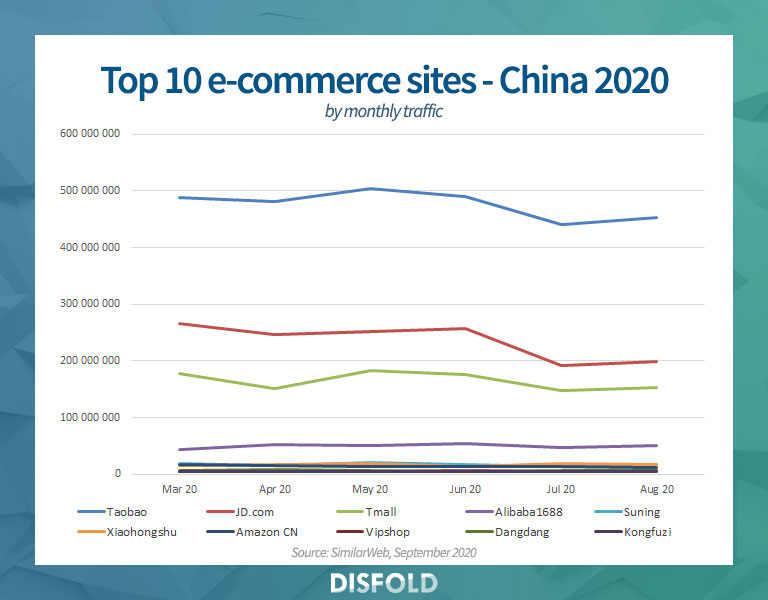
Embed code:
<a href="https://blog.disfold.com/top-e-commerce-sites-china/" target="_blank" rel="noopener noreferrer"><img src="https://blog.disfold.com/wp-content/uploads/2020/09/top-10-ecommerce-sites-china.jpg" alt="Top 10 e-commerce sites in China 2020"></a>
Other leading players in the Chinese e-commerce landscape
Besides these platforms that provide products from multiple categories, one company can also be remarked for particularly standing out, even though it is not purely in the e-commerce market. As it primarily proposes group deals, vouchers, and coupons, Meituan Dianping, participates in the e-commerce landscape by referring to other shops, even though its key websites don’t sell products directly.
But its two main websites deserve a mention as they still reach a large portion of the market. With more than 20 million visits per month Dianping.com, is the leader in online deals, and the second website, Meituan.com, which was acquired by Dianping, also reaches about 10 million visits per month. This presence also makes Meituan Dianping a notable player of online shopping in China.
Here are the top e-commerce platforms in China. Have you ever bought goods or services from them? How was the experience, is the price cheaper and the delivery convenient? Let us know in the comments below!









![Top 1200 UK Companies [FTSE All-Share + FTSE AIM All-Share] – Excel Download](http://store.disfold.com/wp-content/uploads/sites/11/2024/05/top-1200-uk-companies-ftseallshare-aimallshare-small.jpg)
![Top 500 Australian Companies [All Ordinaries] – Excel Download](http://store.disfold.com/wp-content/uploads/sites/11/2021/04/top-500-australian-companies-allordinaries-small.jpg)